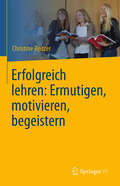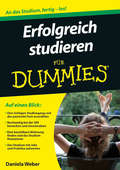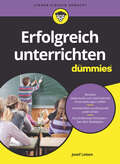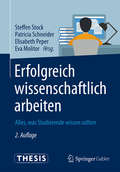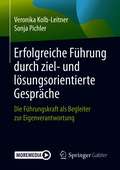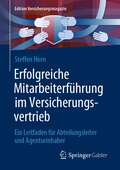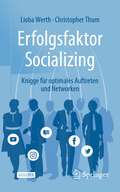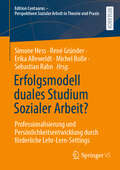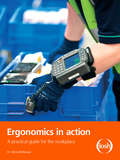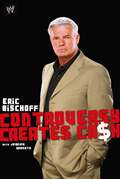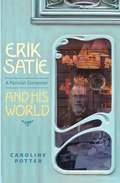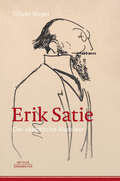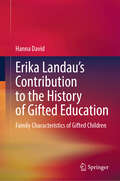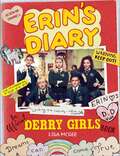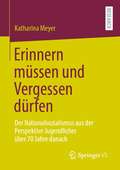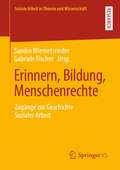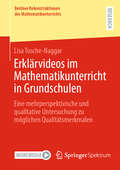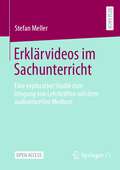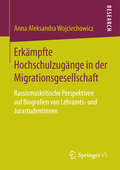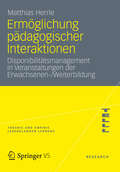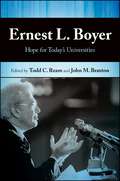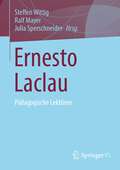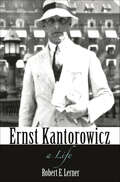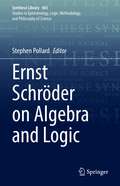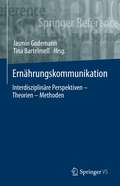- Table View
- List View
Erfolgreich lehren: Ermutigen, motivieren, begeistern
by Christine ReitzerUnmotiviertes Lernverhalten und abgelenkte Studenten stellen für Lehrende wie für Lernende ein zentrales Problem im Unterricht dar. In diesem Buch wird sowohl etabliertes psychologisches Wissen wie auch Erkenntnisse aus persönlichen Umfragen nutzbar gemacht, um diesem Phänomenen unserer Zeit gezielter begegnen zu können. Sie müssen nicht "ein geborener Lehrer" sein um Ihre Lehre ansprechend zu gestalten. Dieses Werk zeigt eine Fülle von Maßnahmen auf, die Sie für die Praxis berücksichtigen und dadurch Ihre Lehrtätigkeit noch erfolgreicher und effektiver gestalten können.Der Schwerpunkt liegt in diesem Werk auf ermutigenden Ideen, ansprechendem Unterrichtsklima, intrinsischen Motivationsmethoden und professioneller Gesprächsführung. Diese Punkte können Sie als Leser einfach umsetzen, ohne große Programme bemühen zu müssen. Hierzu werden effektive Grundkonzepte vorgestellt, die anhand von Fallbeispielen präzisiert werden. Diese werden abgerundet durch konkrete, praxistaugliche Tipps für typische Alltagssituationen. Diese praxisnahen Hilfestellungen eignen sich für den Unterricht bzw. die Lehre in verschiedenen Wissenschaftszweigen und dienen zur Motivation der Teilnehmer. Dabei schöpft die Autorin aus ihrem eigenen internationalen Erfahrungsschatz sowie aus dem Fundus von vielen weltweit erfahrenen Lehrenden, die sich an den Umfragen beteiligt haben.Zielgruppen für dieses Werk sind alle, die lehren oder sich auf ihre Lehrtätigkeit vorbereiten möchten.
Erfolgreich studieren fur Dummies (Für Dummies)
by Daniela WeberSich für ein Studium zu entscheiden, ist der erste, entscheidende Schritt. Aber dann geht's erst richtig los: informieren, organisieren und Entscheidungen treffen. Daniela Weber hilft Ihnen nicht nur bei den ersten Schritten wie der Wahl des Studienfachs und der Uni, sondern erklärt auch, wie Sie sich bewerben, wie Sie Ihr Studium finanzieren und mit Jobs, Praktika und Auslandsaufenthalten aufwerten. Sie erfahren auch, wie Sie Ihren Uni-Alltag optimal strukturieren und wie Sie sich auf Prüfungen vorbereiten, bis Sie schließlich den Abschluss in der Tasche haben. Kurz: der zuverlässige Ratgeber für alle Fragen rund ums Studium.
Erfolgreich unterrichten für Dummies (Für Dummies)
by Josef LeisenDieses Buch hilft Ihnen, unterrichtliche Situationen handwerklich professionell zu bewältigen. Das Wissen, das es dafür braucht, wird im Buch mitgeliefert, steht aber nicht im Vordergrund. Vielmehr setzt das Buch an Ihrem Denken und Ihrem Selbstverständnis an. Typische Unterrichtssituationen werden beschrieben und - abhängig von Ihrer Lehrerpersönlichkeit - analysiert: Was ist der Knackpunkt? Was müssen Sie darüber wissen? Wie können Sie damit umgehen? Was sollten Sie beherzigen?
Erfolgreich wissenschaftlich arbeiten: Alles, Was Studierende Wissen Sollten
by Steffen Stock Patricia Schneider Elisabeth Peper Eva MolitorDie Autoren vermitteln in diesem Buch Techniken, mit denen sich alle Prüfungsformen im Rahmen des Studiums meistern lassen. Zu den Instrumenten gehören Lese- und Schreibtechniken sowie die gezielte Vorbereitung auf Referate. Hochschuldozenten selbst schildern in dem Band, was sie von den Studenten erwarten. Der interdisziplinäre Ratgeber präsentiert das geballte Wissen vieler Hochschulabsolventen und ist für Studierende aller Disziplinen geeignet.
Erfolgreiche Führung durch ziel- und lösungsorientierte Gespräche: Die Führungskraft als Begleiter zur Eigenverantwortung
by Veronika Kolb-Leitner Sonja PichlerIn diesem Fachbuch erfahren Führungskräfte, wie sie das Führungsinstrument Gesprächsführung wirksam nutzen können. Als Führungskraft haben Sie das Gefühl, immer wieder über dieselben Themen mit Ihren MitarbeiterInnen zu sprechen. Die Gespräche bleiben oft ohne Wirkung. Die vermeintlich konstruktive Kritik-Formel „Ich habe beobachtet...“ schafft innere Widerstände beim Gegenüber und erschwert den Weg zur Lösung.Der Fokus in der Führungsarbeit braucht eine neue Richtung und eine Zusammenführung von pädagogischem und psychologischem Wissen. Die erfolgreiche Führungskraft begleitet und unterstützt ihre MitarbeiterInnen dabei, durch Selbstreflexion eigene Lösungen und neue Wege zu finden. Es ist der positive Dreh in der Gesprächsführung durch die Führungskraft, der den Unterschied macht: vom Problem zur Lösung, vom Hindernisdenken zum Lösungsdenken, von negativ besetzter Emotion zur hilfreichen Ressource, von Volatilität zu Stabilität, von Ressourcenverschwendung zur Effizienz. Dieses Buch vermittelt neben theoretischen Hintergründen viele praktische Werkzeuge für den Führungsalltag, die zum Probieren anregen. Zusätzlich gibt es einige Beispiel- und Erklärvideos, die Sie sich mit der kostenlosen SN More Media App anschauen können. Aus dem InhaltLernen im Erwachsenenalter: Veränderungsprozesse ermöglichenFührungsarbeit ist Pädagogik (Andragogik)Emotionen als Ressource nutzenWirksame Gesprächsführung: Gesprächsmuster, vom Problem zur Lösung, die Magie des Zuhörens, das Wunder des Fragens Kritikgespräch als Befähigungsgespräch, Umgang mit Angriffen
Erfolgreiche Mitarbeiterführung im Versicherungsvertrieb: Ein Leitfaden für Abteilungsleiter und Agenturinhaber (Edition Versicherungsmagazin)
by Steffen HornDas Buch bietet einen anwendungsorientierten Leitfaden für Vorgesetzte von Angestellten und Vermittlern in der Finanzdienstleistungsbranche. Es richtet sich also an Praktiker, die im Management und/oder der Führung vor den wachsenden Herausforderungen der Sinnhaftigkeit und Praxistauglichkeit ihres Tuns stehen. Der Autor greift wiederkehrende Situationen des Alltags auf und stellt Ideen, Möglichlichkeiten zur Lösung vor. Checklisten und Arbeitsblätter helfen, Struktur in das Vorhaben zu bringen. Beliebte Praxisansätze werden aufgegiffen und beschrieben. Sie ermöglichen den Blick auf ein Gelingen und das oft vorausgendes Versuchen bzw. Scheitern. Viele der vorgestellten Inhalte können mit einem digitalen Arbeitsblatt (pdf. Word, Excel) vertieft werden. Die Arbeitsblätter dienen der Umsetzung in der Praxis und können unmittlebar zur Anwendung kommen. Ziel des Buches ist es, eigene Erfahrungen im Bereich der Führung/des Managments aufzuzeigen. Das Buch soll auch als Arbeitsbuch nutzbar sein. Der Abgleich für das eigene Tun trifft dabei ergänzende Sichtweisen und wagt den Spagat zwischen Erstbegegnung und Ausbau vorhandener Führungserkenntnisse. Es zeigt eingene Visionen und will Wirkung an der Baisis erzielen. Führung ist mehr als der Wunsch die Welt zu verändern und finanziell unabhängig zu sein. Mit zunehmender Digitalisierung wird auch die Kommunikation, Verbindlichkeit und Durchdringung alter Themen neue Formen einnehmen. Auch hier wollen wir den Fokus setzen.
Erfolgsfaktor Socializing: Knigge für optimales Auftreten und Networken
by Lioba Werth Christopher ThumSocializing ist so bedeutsam geworden wie nie zuvor. Menschlich miteinander „zu können“, ist wichtiger denn je, da der Wettbewerb immer stärker und die Nischen immer kleiner werden. Trotz des Wunsches, es möge „leicht und locker“ sein, gilt es, Eindruck zu machen, sich zu präsentieren und Geschäfte abzuschließen. Worauf kommt es nun wirklich an? Was vom alten Knigge, den bisherigen Umgangsformen und Erfolgsfaktoren gilt noch? Wie bespielt man die moderne Berufswelt im Sinne von Socializing und Networking? In diesem informativen und unterhaltsamen Ratgeber von der Psychologie-Professorin Lioba Werth und dem Gastronomiefachmann Christopher Thum wird Ihnen gezeigt, wie Sie berufliches Socializing sowohl klassisch, modern und smart verstehen und bespielen können. Smalltalk, Networking und Etikette werden nicht als Selbstzweck, sondern als eine Art Methode dargestellt, mit der Sie in vielen unausgesprochenen Botschaften signalisieren können, wie Sie auch außerhalb der Büroumgebung mit anderen Menschen umgehen.
Erfolgsmodell duales Studium Sozialer Arbeit?: Professionalisierung und Persönlichkeitsentwicklung durch förderliche Lehr-Lern-Settings (Edition Centaurus - Perspektiven Sozialer Arbeit in Theorie und Praxis)
by Simone Hess René Gründer Sebastian Rahn Erika Alleweldt Michel BoßeIn dualen Studiengängen Sozialer Arbeit und Sozialpädagogik wird eine enge Verzahnung von Theorie und Praxis angestrebt. Daher hat das duale Studium Sozialer Arbeit in den vergangenen Jahren an Attraktivität gewonnen. Das Buch dokumentiert Ansätze zur Bewältigung der konzeptionellen, didaktischen und organisationellen Herausforderungen dualer Studiengänge aus Sicht von Lehrenden und Studierenden an privaten und staatlichen Hochschulen. Insbesondere die Gestaltung von Anleitungsprozessen in Praxiskontext und Hochschule, die Persönlichkeitsentwicklung und Studierbarkeit dualer Studiengänge, Lehr- und Lernformen im Kontext von Theorie-Praxis-Verzahnung sowie bildungswissenschaftliche Studien zur Qualität dualer Studienangebote stehen dabei im Fokus.
Ergonomics in Action: A Practical Guide for the Workplace
by Celine McKeownThis is a reprint of 978-0-901357-47-2 Ergonomics in action: a practical guide for the workplace is a no-nonsense introduction to the principles of workplace ergonomics. The book is very user-friendly and written in a clear, jargon-free style, and gives straightforward explanations and practical examples. Useful summaries at the end of each chapter highlight key points at a glance. The book focuses on ergonomics in the design process, job design and work organisation. It covers specific areas of ergonomic importance; including hand tools, computer use and manual handling, and also addresses the complex and sometimes controversial topic of upper limb disorders. Ergonomics in action also includes a chapter on the basics of anthropometry and offers several practical case studies to illustrate the human and commercial benefits of following good ergonomic principles. As a consultant ergonomist, Celine McKeown has extensive experience of applying the principles of ergonomics to a wide variety of sectors. She also trains, advises and writes on a broad range of ergonomics and health and safety issues.
Eric Bischoff: Controversy Creates Cash
by Jeremy Roberts Eric BischoffEric Bischoff has been called pro wrestling's most hated man. He's been booed, reviled, and burned in effigy. Fans have hurled everything from beer bottles to fists at him. Industry critics have spewed a tremendous amount of venom about his spectacular rise and stupendous crash at World Championship Wrestling. But even today, Eric Bischoff's revolutionary influence on the pro wrestling industry can be seen on every television show and at every live event. Bischoff has kept quiet while industry "pundits" and other know-it-alls pontificated about what happened during the infamous Monday Night Wars. Basing their accounts on third- and fourth-hand rumors and innuendo, the so-called experts got many more things wrong than right. Now, in Controversy Creates Cash, Bischoff tells what really happened. Beginning with his days as a salesman for Verne Gagne's American Wrestling Association, Bischoff takes readers behind the scenes of wrestling, writing about the inner workings of the business in a way never before revealed. He demonstrates how controversy helped both WCW and WWE. Eric gives the real numbers behind WCW's red ink -- far lower than reported -- and talks about how Turner Broadcasting's merger with Time Warner, and then Time Warner's merger with AOL, devastated not only WCW but many creative and entrepreneurial businesses within the conglomerate. Bischoff has surprisingly kind words for old rivals like Vince McMahon, but pulls no punches with friends and enemies alike. Among his revelations: How teaming with Mickey Mouse turned WCW into a national brand. Why Hulk Hogan came to WCW. Why he fired Jesse Ventura for sleeping on the job. Why Steve Austin didn't deserve another contract at WCW, and how Bischoff's canning him was the best thing that ever happened to Austin. How Ted Turner decided WCW should go head-to-head against Raw on Monday nights. How Nitro revolutionized wrestling. Where the New World Order really began. How corporate politics killed WCW. And how he found his inner heel and learned to love being the guy everyone loves to despise. Bischoff brings a surprisingly personal touch to the story, detailing his rough-and-tumble childhood in Detroit, talking about his family and the things he did to cope with the stress of the high-octane media business. Now a successful entertainment producer as well as a wrestling personality, Bischoff tells how he found contentment after being unceremoniously "sent home" from WCW. Love him or hate him, readers will never look at a pro wrestling show quite the same way after reading Bischoff's story in Controversy Creates Cash.
Erik Satie: A Parisian Composer And His World
by Caroline PotterThe music of Erik Satie (1866-1925) appeals to wide audiences and has influenced both experimental artists and pop musicians. Little about Satie was conventional, and he resists classification under easy headings such as "classical music". Instead of pursuing the path of a professional composer, Satie initially earned a living as a café pianist and moved in bohemian circles which prized satire, popular culture and experiment. Small wonder that his music is fundamentally new in conception. It is music which is not always designed to be listened to attentively: music which can be machine-like but is to be played by humans. For Satie, music was part of a wider concept of artistic creation, as evidenced by his collaborations with leading avant-garde artists and in works which cross traditional genre boundaries such as his texted piano pieces. His music was created in some of the most exciting and creatively stimulating environments of the late nineteenth and early twentieth century: Montmartre and Montparnasse. Paris was the artistic centre of Europe, and Satie was a notorious figure whose music and ideas are inextricably linked with the City of Light. This book situates Satie's work within the context and sonic environment of contemporary Paris. It shows that the influence of street music, musicians and poets interested in new technology, contemporary innovations and radical politics are all crucial to an understanding of Satie. Music from the ever-popular Gymnopédies to newly discovered works are discussed, and an online supplement features rare pieces recorded especially for the book. CAROLINE POTTER is Reader in Music at Kingston University London. A graduate in both French and Music, she has published widely on French music since Debussy and was Series Advisor to the Philharmonia Orchestra's Paris 2014-15 season.
Erik Satie: Der skeptische Klassiker
by Oliver VogelErik Satie (1866-1925) gilt allgemein als eine Ikone der Moderne. Nach mehreren Jahrzehnten erscheint nun erstmals wieder eine deutschsprachige Gesamtdarstellung seines Lebens und Schaffens. Der auf dem Montmartre sozialisierte Musikpionier war ein Fragender. In skeptischer Absicht schärfte er seinen Humor, um auch seine Zeitgenossen nach sokratischer Manier zu prüfen. Unbefangen stellte er sich nach Art eines Amateurs immer wieder neuen Voraussetzungen. Von den autoritären Zügen der musikalischen Tradition dagegen nahm er Abstand, ohne doch den Anspruch aufzugeben, gelegentlich – in Resonanz mit den anderen Künsten – klassische Modelle vorzulegen. Vom Symbolismus bis zum Dadaismus wirkte er inmitten der Besten, weswegen diese neue Biographie zugleich auch in die Mitte des Pariser Künstlerkosmos eintaucht. Aus dem reichen Journalismus des 19. und 20. Jahrhunderts fördert Oliver Vogel eine Vielzahl unbekannter Anekdoten zutage und verdichtet die Stimmen derer, die dabei waren, zu einem lebendigen Konzert.
Erika Landau’s Contribution to the History of Gifted Education: Family Characteristics of Gifted Children
by Hanna DavidThis book describes some of the most critical issues in gifted education, i.e., gender inequity concerning giftedness examinations and the boys/girls ratio. The book also discusses the background of the gifted child's family, including their parents&’ education and number of their siblings. The book&’s findings are based on quantitative studies concerning 5–15-year-old gifted children participating at the Erika Landau Institute for Gifted and Creative Children and Youths in Tel Aviv, Israel, from 1968 until 2003. It discusses aspects such as the advantages of affirmative action standards in gifted education because girls who score lower than boys on the admission test to a gifted program usually have better social skills, persistence, and fine motor skills and, thus, integrate successfully in a gifted group with boys of higher intelligence. The book's second part addresses Landau's academic work in multiple languages and offers a critique that helps educators and mental health experts build gifted programs.
Erin's Diary: An Official Derry Girls Book
by Lisa McGeeSet in Derry, Northern Ireland in the 1990s, Derry Girls is a candid, one-of-a-kind comedy about what it's like to be a teenage girl living amongst conflict.It's a time of armed police in armoured Land Rovers and British Army check points. But it's also the time of Murder She Wrote, The Cranberries, Salt-N-Pepa, Doc Martens and The X Files. And while The Troubles may hang over her hometown, Erin has troubles of her own, like the fact that the boy she's in love with (actually in LOVE with) doesn't know she exists. Or that her Ma and Aunt Sarah make her include her weirdo cousin Orla in everything she does. Or that head teacher Sister Michael refuses to acknowledge Erin as a literary genius. Not to mention the fact that her second best friend has ALMOST had sex, whereas Erin's never even kissed anyone yet. These are Erin's Troubles.Described by the Guardian as 'daft, profane and absolutely brilliant', by the New Statesman as 'pitch-perfect' and by i-D as 'the greatest show on British (and Irish) TV', Derry Girls has dazzled audiences for two series, with Channel 4's biggest UK comedy launch since 2004 and the biggest television series in Northern Ireland since modern records began.Now, this autumn, comes the first official tie-in. In the manner of the very best TV comedy books, Erin's Diary is a hilarious 'in world' publication that extends the laugh-out-loud humour of Derry Girls onto the page. With Erin's inner take on everything that has happened so far, this book will both dive deeper into the events we have seen unfold on the screen and unveil brand new stories and never-before-revealed details about characters. Complete with newspaper clippings, doodles, poetry, school reports, handwritten notes from her friends, and much much more, Erin's Diary is as warm, funny and brilliantly observed as the TV; a must-have for fans this Christmas.'Erin is sixteen and wishes she had a boyfriend and a life. Nothing else really happens... It's boring.' Orla McCool
Erinnern müssen und Vergessen dürfen: Der Nationalsozialismus aus der Perspektive Jugendlicher über 70 Jahre danach
by Katharina MeyerMehr als 70 Jahre nach dem Ende des Nationalsozialismus prägt die wachsende zeitliche Distanz zum historischen Geschehen die Auseinandersetzung mit diesem. Veränderte familiäre Bezüge, der Abschied von Zeitzeug*innen und gegenwärtige gesellschaftliche Diskurse nehmen Einfluss auf die Perspektiven Jugendlicher. Dies wirft eine Vielzahl von Fragen auf: Wie beschäftigen sich junge Menschen in Deutschland mehr als sieben Jahrzehnte nach dem Holocaust mit dem Thema? Welche Relevanz hat der Nationalsozialismus für sie, welche geschichtlichen Vorstellungen von der Zeit haben sie und wie erleben sie den Umgang damit in Deutschland? Die Studie geht diesen Fragen anhand des Gruppendiskussionsverfahrens und der Grounded Theory Methodologie empirisch nach, nimmt Kontinuitäten und Brüche in den Bezügen zum Nationalsozialismus in den Blick und zeigt Zusammenhänge zur Identifikation mit Deutschland auf.
Erinnern, Bildung, Menschenrechte: Zugänge zur Geschichte Sozialer Arbeit (Soziale Arbeit in Theorie und Wissenschaft)
by Sandro Bliemetsrieder Gabriele FischerGeschichte der Sozialen Arbeit bedeutet nicht nur das Erzählen einer Geschichte. Dieser Geschichte liegen historische Quellen zugrunde, die genutzt wurden oder nicht genutzt werden konnten. Es werden Perspektiven relevant, die aus der jeweiligen Gegenwart Sachverhalte sehen oder auch nicht. Methoden der Nutzung der Quellen können Perspektiven eröffnen oder müssen sich erklären.Der vorliegende Band diskutiert Zugänge zu Geschichte und Erinnern, konkrete historische Konstellationen, spezifische historische Quellen und ihre Deutungsmöglichkeiten sowie Ansätze, wie das Wagnis historischer Rekonstruktionen als Bildung im Sinne der Menschenrechte verstanden werden kann.
Erklärvideos im Mathematikunterricht in Grundschulen: Eine mehrperspektivische und qualitative Untersuchung zu möglichen Qualitätsmerkmalen (Berliner Rekonstruktionen des Mathematikunterrichts)
by Lisa Tusche-NaggarSeit dem Beginn der Covid-19-Pandemie im März 2020 und den damit einhergehenden Schulschließungen finden Erklärvideos vermehrt Einsatz im Mathematikunterricht. In ihrem Buch widmet sich Lisa Tusche-Naggar den Qualitätsmerkmalen von ‚guten&‘ Mathematik-Erklärvideos. Ziel ist es, nachvollziehbar zu machen, welche Intentionen und Kriterien bei der Erstellung, der Auswahl und der Rezeption dieser Videos zum Tragen kommen. Durch Interviews und Gruppendiskussionen mit verschiedenen relevanten Akteursgruppen werden unterschiedliche Perspektiven auf die Qualität von Erklärvideos rekonstruiert und miteinander verglichen. Das Buch beleuchtet sowohl die Schnittmengen als auch die Unterschiede der Sichtweisen der Produzent*innen von Erklärvideos, der Lehrkräfte und Schüler*innen, die Erklärvideos als Ressource des Mathematikunterrichts nutzen, sowie der Mathematikdidaktik, welche die Mittel zur theoretischen Reflexion von Erklärvideos bereitstellt. Das Buch bietet damit ein mehrperspektivisches Bild möglicher Qualitätsmerkmale von Mathematik-Erklärvideos und präsentiert zudem Ideen, wie diese Videos effektiv in den Mathematikunterricht integriert werden können.
Erklärvideos im Sachunterricht: Eine explorative Studie zum Umgang von Lehrkräften mit dem audiovisuellen Medium
by Stefan MellerIn diesem Open-Access-Buch wird ausgehend vom aktuellen Forschungsdiskurs der didaktische Einsatz von Erklärvideos im Sachunterricht untersucht. Der Sachunterricht stellt aufgrund seines umfassenden Bildungsauftrags ein herausforderndes Betätigungsfeld für Lehrkräfte dar. Das audiovisuelle Medienformat Erklärvideo kommt dabei zunehmend zur Anwendung. Anhand einer explorativen qualitativ-empirischen Studie mit österreichischen und deutschen Grundschullehrkräften wird ein Rahmenmodell zum Erklärvideoeinsatz im Sachunterricht entwickelt. Die Ergebnisse zeigen, dass sowohl die Schulschließungen im Zuge der Coronapandemie als auch der individuelle Umgang mit dem Bildungsauftrag des Sachunterrichts Motive für den Einsatz von Erklärvideos darstellen. Es werden Vorgehensweisen bei der Auswahl bzw. Gestaltung von Erklärvideos sowie didaktische Zielsetzungen und situationsspezifische Umgangsformen mit dem Medium identifiziert. Einflussfaktoren für die Nutzung von Erklärvideos sind die Verfügbarkeit passender Angebote, die technische Ausstattung sowie personenbezogene Faktoren wie persönliches Interesse und Medienkompetenz. Qualitätsvolle Erklärvideos im Sachunterricht können bei zweckmäßigem Einsatz als geeignete Bildungsressourcen für die Lernenden und als didaktisches Werkzeug für die Lehrenden betrachtet werden.
Erkämpfte Hochschulzugänge in der Migrationsgesellschaft: Rassismuskritische Perspektiven auf Biografien von Lehramts- und Jurastudentinnen
by Anna Aleksandra WojciechowiczAnna Aleksandra Wojciechowicz widmet sich den Zugangsbedingungen zum fachspezifischen Hochschulstudium im Kontext migrationsgesellschaftlicher Ungleichheitsverhältnisse. Mittels einer biografisch-rassismuskritischen Analyse narrativer Interviews mit Lehramts- und Jurastudentinnen rekonstruiert sie biografische Erfahrungszusammenhänge und ihre Verarbeitung in Prozessen des Bildungsaufstiegs und der Bildungsreproduktion. Dabei erweisen sich ‚schulinstitutionelle Blockierungenʻ als ein für die Biografien konstitutives Moment. Herausgearbeitet werden u.a. die ‚Beweisarbeitʻ und das ‚Systemmisstrauenʻ als zwei Strategien, mit denen den daraus entstandenen Widersprüchen begegnet wird. Die beiden Konzepte werden anschließend in ihrer Bedeutung für den Hochschulzugang diskutiert.
Ermöglichung pädagogischer Interaktionen
by Matthias HerrleVielerorts wird heute über Möglichkeiten der Optimierung des Lehr-Lerngeschehens in pädagogischen Veranstaltungen diskutiert. Welche Organisationsprinzipien für den Prozess der Herstellung dieses Geschehens von Bedeutung sind, darüber ist indes noch wenig bekannt. Anhand videographischer Analysen von Etablierungsphasen in Veranstaltungen der Erwachsenenbildung/Weiterbildung vermittelt die Interaktionsstudie von Matthias Herrle neue Einblicke in die multimodale Komplexität solcher Herstellungsprozesse. Durch eine Vielzahl an Abbildungen wird ein breites Spektrum an Methoden illustriert, das die Beteiligten selektiv nutzen, um ihr Agieren zu koordinieren. Es wird gezeigt, mit welchen strukturellen Problemen sie im Interaktionsablauf konfrontiert sind und welche Varianten im Umgang mit ihnen realisiert werden. Auf diese Weise wird deutlich, welche interaktiven (Vor-)Leistungen den alltäglichen Vollzug des "pädagogischen Geschäfts" konstituieren und auch jenseits des Anfang(en)s zu seiner Strukturierung beitragen.
Ernest L. Boyer: Hope for Today's Universities
by John M. Braxton Todd C. ReamHaving served as chancellor of the State University of New York, the United States commissioner of education, and president of the Carnegie Foundation for the Advancement of Teaching, Ernest L. Boyer (1928–1995) was one of the most prominent leaders in the history of American higher education. Arguably more aware of the challenges facing colleges and universities than any of his peers, the administrative decisions and the writings he left behind provide a wealth of possibilities for subsequent generations of administrators and faculty members. In this book noted higher education scholars examine some of the most pressing crises in higher education today, pairing their thoughts with relevant selections from Boyer's important writings—some published here for the first time. The volume provides answers to questions perceived to be plaguing academe, while reintroducing readers to the optimistic and insightful wisdom of Ernest L. Boyer.
Ernesto Laclau: Pädagogische Lektüren
by Ralf Mayer Steffen Wittig Julia SperschneiderDer Band diskutiert ausgewählte Positionen der Theoriebildung Ernesto Laclaus, die in den letzten Jahren im Kontext demokratietheoretischer Debatten zwar in politik-, kultur- und sozialwissenschaftlichen Feldern rezipiert wurde, deren Aufnahme in erziehungswissenschaftlichen Debatten aber eher als ‚handverlesen‘ bezeichnet werden könnte. Die Rezeption beschränkt sich häufig auf spezifische Einsätze rund um die gemeinsam mit Chantal Mouffe in Hegemonie und radikale Demokratie entwickelte und an Antonio Gramsci ansetzende Hegemonietheorie. Dass Laclaus Perspektiven jedoch eine Vielzahl produktiver Anschlüsse und Irritationen für unterschiedliche pädagogische Frage- und Problemstellungen beinhalten, verdeutlichen die hier versammelten Beiträge rund um transdisziplinäre Spannungsverhältnisse von Politik, Bildung und Pädagogik, von Artikulation und Repräsentation, von Ontologie und Identität oder im Kontext aktueller Sichtweisen auf Inklusion, Solidarität, Migration, pädagogische Beziehungen und Professionalität.
Ernst Kantorowicz: A Life
by Robert E. LernerThe first complete biography of an influential historian whose dramatic life intersected with many great events and thinkers of the twentieth centuryThis is the first complete biography of Ernst Kantorowicz (1895–1963), an influential and controversial German-American intellectual whose colorful and dramatic life intersected with many of the great events and thinkers of his time. A medieval historian whose ideas exerted an influence far beyond his field, he is most famous for two books—a notoriously nationalistic 1927 biography of the Holy Roman Emperor Frederick II and The King's Two Bodies (1957), a classic study of medieval politics.Born into a wealthy Prussian-Jewish family, Kantorowicz fought on the Western Front in World War I, was wounded at Verdun, and earned an Iron Cross; later, he earned an Iron Crescent for service in Anatolia before an affair with a general’s mistress led to Kantorowicz being sent home. After the war, he fought against Poles in his native Posen, Spartacists in Berlin, and communists in Munich. An ardent German nationalist during the Weimar period, Kantorowicz became a member of the elitist Stefan George circle, which nurtured a cult of the "Secret Germany." Yet as a professor in Frankfurt after the Nazis came to power, Kantorowicz bravely spoke out against the regime before an overflowing crowd. Narrowly avoiding arrest after Kristallnacht, he fled to England and then the United States, where he joined the faculty at Berkeley, only to be fired in 1950 for refusing to sign an anticommunist “loyalty oath.” From there, he “fell up the ladder” to Princeton’s Institute for Advanced Study, where he stayed until his death.Drawing on many new sources, including numerous interviews and unpublished letters, Robert E. Lerner tells the story of a major intellectual whose life and times were as fascinating as his work.
Ernst Schröder on Algebra and Logic (Synthese Library #465)
by Stephen PollardThis volume offers English translations of three early works by Ernst Schröder (1841-1902), a mathematician and logician whose philosophical ruminations and pathbreaking contributions to algebraic logic attracted the admiration and ire of figures such as Dedekind, Frege, Husserl, and C. S. Peirce. Today he still engages the sympathetic interest of logicians and philosophers. The works translated record Schröder’s journey out of algebra into algebraic logic and document his transformation of George Boole’s opaque and unwieldy logical calculus into what we now recognize as Boolean algebra. Readers interested in algebraic logic and abstract algebra can look forward to a tour of the early history of those fields with a guide who was exceptionally thorough, unfailingly honest, and deeply reflective.
Ernährungskommunikation: Interdisziplinäre Perspektiven – Theorien – Methoden
by Jasmin Godemann Tina BartelmeßDer Band bietet einen umfassenden Überblick über den Stand der sozialwissenschaftlichen Ernährungsforschung: von interdisziplinären Perspektiven, über Kontexte und theoretische Bezüge bis hin zu verschiedenen methodischen Ansätzen, die an exemplarischen Studien veranschaulicht werden. Damit ist der Band in seiner wissenschaftlichen Ausrichtung sowie seiner thematischen Fokussierung auf Ernährungskommunikation einzigartig und bezieht aktuelle gesellschaftliche Diskurse und Herausforderungen mit ein.
